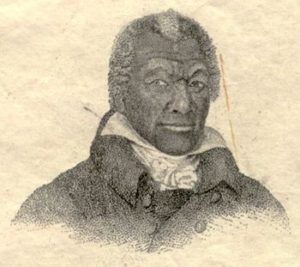
James Lafayette
*James Lafayette’s birth in 1748 is celebrated on this date. He was a Black slave and an American patriot.
Born on William Armistead's New Kent County farm in 1781, he received permission to leave his master's service and volunteer with the American forces under the Marquis de Lafayette (a young French general and American ally). During this time, the British had devastated Richmond, looting and burning much of the city and chasing the Virginia legislature from the Capitol; thus, the General's offer to assist the small army came at a critical time.
Gen. Lafayette began sending spies behind British lines. Impressed with his aptitude and memory, he sent him to enemy camps to get information on troop numbers, gun locations, and the army's morale. He first worked as a volunteer in the camp of Benedict Arnold, who led one of two British armies in Richmond. Lord Charles Cornwallis led the other.
Historians believe his job as a trusted servant allowed him to stand by as the general and officers discussed plans while they ate and drank. Risking his life, he would later whisper what he overheard to other trusted Blacks in the camp, who passed the information on to the General. He later returned to the General's camp and told him that Cornwallis had sent him as a spy.
His work as a master spy helped keep enemy troop advances in check and set the stage for George Washington's victory at Yorktown, the final battle in the war. After the British surrender, Cornwallis visited General Lafayette's headquarters, where he saw James, who he thought was his spy, wearing an American uniform. In 1784, Gen. Lafayette wrote a certificate to the Virginia legislature praising and requesting companion James to be a free man, which was granted in 1787. James took Lafayette as his surname.
Twenty-three years he was passed before the state awarded James Lafayette the annual pension paid to whites who had taken part in the war. The state later awarded James Lafayette an annual pension for his service to the American cause during the Revolutionary War. In 1824, the aging Marquis toured America for the last time. While in Richmond, he met his old comrade James, who was then 76. During this visit, James Lafayette sat for his portrait dressed in a military coat. It hangs in Richmond's Valentine Museum. James Lafayette died in 1830.
Black First:
2,000 years of extraordinary achievement
by Jessie Carney Smith
Copyright 1994 Visible Ink Press, Detroit, MI
ISBN 0-8103-9490-1